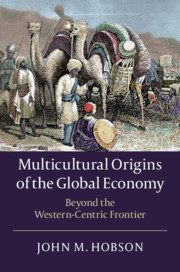Book contents
- Multicultural Origins of the Global Economy
- Multicultural Origins of the Global Economy
- Copyright page
- Dedication
- Contents
- Figures
- Tables
- Acknowledgements
- 1 Mapping a New Global Political Economy
- Part I Multicultural Origins of the First (Historical Capitalist) Global Economy, 1500–1850
- Part II What Was Global about the First Global Economy, 1500–c. 1850?
- Part III Empire and the First Global Economy in the Making of Modern Industrial Capitalism, 1500–1800
- 9 The Global Atlantic Production Driver and the Imperial Primitive Accumulation of British Capital
- 10 The Global Atlantic Consumption Driver and British Late-Developmental Agency in Global Uneven and Combined Development
- Part IV The Second Great Divergence, 1600–1800: Differing ‘Developmental Architectures’ in Global Contexts
- Part V Rehabilitating and Provincialising Western Imperialism: Afro-Asians inside and outside the Shadow of Empire
- Book part
- Bibliography
- Index
10 - The Global Atlantic Consumption Driver and British Late-Developmental Agency in Global Uneven and Combined Development
from Part III - Empire and the First Global Economy in the Making of Modern Industrial Capitalism, 1500–1800
Published online by Cambridge University Press: 17 December 2020
- Multicultural Origins of the Global Economy
- Multicultural Origins of the Global Economy
- Copyright page
- Dedication
- Contents
- Figures
- Tables
- Acknowledgements
- 1 Mapping a New Global Political Economy
- Part I Multicultural Origins of the First (Historical Capitalist) Global Economy, 1500–1850
- Part II What Was Global about the First Global Economy, 1500–c. 1850?
- Part III Empire and the First Global Economy in the Making of Modern Industrial Capitalism, 1500–1800
- 9 The Global Atlantic Production Driver and the Imperial Primitive Accumulation of British Capital
- 10 The Global Atlantic Consumption Driver and British Late-Developmental Agency in Global Uneven and Combined Development
- Part IV The Second Great Divergence, 1600–1800: Differing ‘Developmental Architectures’ in Global Contexts
- Part V Rehabilitating and Provincialising Western Imperialism: Afro-Asians inside and outside the Shadow of Empire
- Book part
- Bibliography
- Index
Summary
Chapter 10 analyses the ‘global-Atlantic consumption driver’ of Britain's ‘late-industrialization’ in the context of global uneven and combined development. It returns to the theme of Indian structural power which, through the Afro-Indian global cotton whip of necessity, pushed the British to develop their own cotton sector through industrialization. The story of Britain's cotton industrialization in part rests on meeting the consumption needs of the Africans who accepted predominantly Indian cotton textiles in payment. The British had little choice but to mechanise cotton-textile production first because their spinners were not sophisticated enough to spin the all-important warp thread; and second, because in the face of a tiny workforce they could not compete with the vastly superior output that the millions of Indians (and Chinese) pumped out. Moreover, the British ‘combined’ or emulated various production techniques from the Indians when it came to industrializing their cotton and iron/steel sectors, though they might also have learned from China with respect to the latter sector. Also important was the role of the late-developer British state via the imposition of high tariffs and re-export substitution industrialization. In sum, though British developmental agency was important, so too was the global context.
Keywords
- Type
- Chapter
- Information
- Multicultural Origins of the Global EconomyBeyond the Western-Centric Frontier, pp. 274 - 314Publisher: Cambridge University PressPrint publication year: 2020



